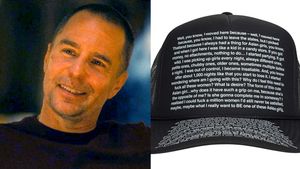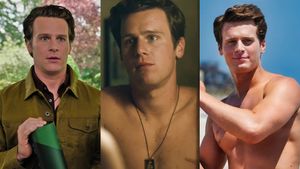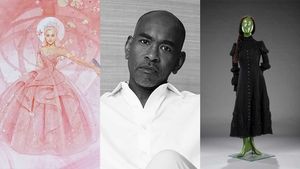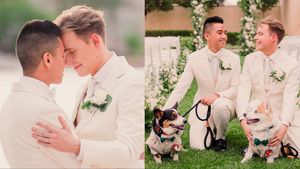Never before have
I been the first in the history of this country to do
anything. But on May 30, I had the chance to say to myself,
Here is something new under the sun.
The U.S.
military's "don't ask, don't
tell" policy created the opportunity for Jake
Reitan, Ezekiel Montgomery, and myself to be among the
first openly gay people to attempt to be accepted by the
armed forces. And so on that Tuesday we three
presented ourselves at a Twin Cities-area
recruiting center and offered to start the enlistment
process for the Armed Services.
"Don't ask" is a federal law, spawned
in 1993 under President Bill Clinton, which prohibits
openly gay, lesbian, or bisexual people from serving
in the military. Not only does it forbid such a person from
signing up for duty, it also sets up ground for dismissal
for the estimated 65,000 LGB soldiers currently in the
military. (Being transgender is a separate issue
altogether under military policy).
Yet the
military's own recruitment handbook is ambiguous. An
enlistment interview may abruptly end if an applicant
has three convictions for driving under the influence,
but it does not officially end if the applicant says,
"I am gay." And "don't ask,
don't tell"--in theory at least--forbids
recruiters from asking applicants about their sexuality.
Yet on the
morning of May 30--even before we began the application
process--an officer unequivocally stated to the press that
the enlistment process would be cut short for any
applicants who stated they were openly gay or lesbian.
But when the process would end exactly remained in
question.
So the three of
us entered the Minnesota National Guard office, sat
through the interview, filled out forms, and answered
questions about our health, education, drug use, and
other things. The rule in practice works like this: If
at the end of the enlistment interview there is no reason
for disqualification other than sexual orientation, the
applicant is informed that he or she is rejected based
on the military's prohibition against
"homosexual conduct"--but is also told of his
or her right to an appeal.
According to the
military, an appeal consists of a statement and two
letters of recommendation in which the recruit provides
evidence that he or she is not actually gay in order
to gain a "favorable decision." As such,
there is no existing appeal format for Jake, Ezekiel, and
me. We will draft our own kind of appeal this summer
in which we tell the military why we are qualified,
openly gay applicants.
Let me be clear
about my sincere intention to serve: I will enlist with
honor and purpose. I will serve my country with pride, but I
will do it only as an openly gay woman.
Jake and Ezekiel
are also serious. After all, our military is missing out
on talented people. Jake and I are both college graduates
who graduated magna cum laude. I am not flattering
myself here. Rather, I am concretely illustrating the
absurdity of this policy. Why is the military not asking
what they are missing out on?
I also have my
personal reasons for trying to sign up for military
service. I met several gay and lesbian cadets while on the
Equality Ride this spring. They need our help. Ten
lesbians banded together to pool a $670 donation.
Cadets at West Point fought alongside a professor to have
us come into their classroom, even though the military
police arrested us for stepping foot onto campus. I
still get letters from soldiers currently serving or
now retired, who all tell me about the fearful and
damaging atmosphere condoned by the antigay policy.
If we three
succeed in our appeal and are permitted to serve, we will
make it known to the world. But looking at federal law, I
predict that a sit-in at the Minneapolis recruitment
office is likely later this summer. In fact, sit-ins
in 31 cities across America are likely because May 30
was a trial run for a larger Soulforce Youth campaign
planned for August and September.
Challenging
"don't ask" is controversial. Personal
views on the war in Iraq and the military complicate
our protest. But whether you fall on the classically
conservative or liberal side of the spectrum, one of the
following facts should raise an alarm:
First, more than
10,000 soldiers have been kicked out under
"don't ask, don't tell,"
and the discharges and violence toward LGBT soldiers only
increased after the legislation became law in 1993.
Second, the
government has spent an estimated $364 million in taxpayer
money retraining soldiers to replace those who have been
discharged. Among the discharged personnel are more
than 400 service members with critical knowledge of
languages that include Korean, Farsi, and Persian.
No one should be
denied a job or fired from their career because of
sexual orientation. "Don't ask, don't
tell" protects the prejudices of heterosexists
in the military and does nothing to protect the career,
dignity, or safety of gay service members.
The American
public does not understand the real effects of this policy
on the capacity of the armed services and the lives of
openly LGBT people. Many people see
"don't ask, don't tell" as a
good compromise--and generally they are people who are
not gay, lesbian, bisexual, or transgender. LGBT
people understand the closet. We understand all the
ways in which a person's sexual orientation is
"told" without being directly
questioned. What did you do for dinner? Where do you go
on leave? Why aren't you dating anyone? Who
was that on the phone? There are an infinite
number of ways to be outed, and "don't
ask" requires that a gay service member
struggle daily to hide her orientation at the risk of
losing her career.
We know the work
does not end simply because they no longer ask, "Are
you gay?" during the enlistment interview.
Our attempt to
join the military on May 30 was an effort to fight for the
rights of all LGB people who have it in their hearts to
serve their country. That may or may not be a foreign
idea to you, but we must agree to fight for the rights
of everyone to be eligible to serve in the armed
services. The cloak of secrecy demanded by
"don't ask, don't tell" does
nothing to affirm our humanity. It is still
government-sanctioned discrimination that makes us
second-class citizens, and to say that it is OK for a
gay person to serve as long as she is quiet about it only
adds insult to injury. The implication remains that a
gay, lesbian, or bisexual person is not fit for
service.
The military is
more than a war machine. It is a guidepost in our
culture. Even if you do not agree with its current actions
or its very nature, you must recognize that it means
something in this society when the largest employer of
youth, one of the most powerful symbols in our
country, and a core player in American values and traditions
says, "Haven Herrin, you are not good enough,
and in fact you are a threat to our nation's
security."
That is the
statement I am fighting, and it comes straight out of
conservative religious thought. Both the meaning of
"don't ask, don't tell"
and its source are dangerous to LGBT equality. I hope you
can support us at Soulforce in fighting this outdated
discrimination.












































































